| This article is part of a series on |
| Canadian Confederation |
|---|
 |
| Conferences |
| People |
| Related |
|
|
The Fathers of Confederation are the 36 people who attended at least one of the Charlottetown Conference of 1864 (23 attendees), the Quebec Conference of 1864 (33 attendees), and the London Conference of 1866 (16 attendees), preceding Canadian Confederation. Only eleven people attended all three conferences.
Table of participation
The following table lists the participants in the Charlottetown, Quebec, and London Conferences and their attendance at each stage.[1][2]
| Participant[2] | Portrait | Province (Current) | Charlottetown | Quebec City | London |
|---|---|---|---|---|---|
| Sir Adams George Archibald |  |
Nova Scotia | Yes | Yes | Yes |
| George Brown | 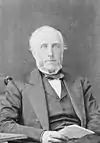 |
Ontario | Yes | Yes | No |
| Sir Alexander Campbell |  |
Ontario | Yes | Yes | No |
| Sir Frederick Carter |  |
Newfoundland | No | Yes | No |
| Sir George-Étienne Cartier |  |
Quebec | Yes | Yes | Yes |
| Edward Barron Chandler |  |
New Brunswick | Yes | Yes | Yes |
| Jean-Charles Chapais |  |
Quebec | No | Yes | No |
| James Cockburn |  |
Ontario | No | Yes | No |
| George Coles | 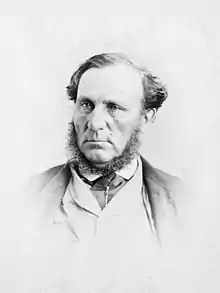 |
Prince Edward Island | Yes | Yes | No |
| Robert B. Dickey |  |
Nova Scotia | Yes | Yes | No |
| Charles Fisher |  |
New Brunswick | No | Yes | Yes |
| Sir Alexander Tilloch Galt | .jpg.webp) |
Quebec | Yes | Yes | Yes |
| John Hamilton Gray | .jpg.webp) |
Prince Edward Island | Yes | Yes | No |
| John Hamilton Gray | .jpg.webp) |
New Brunswick | Yes | Yes | No |
| Thomas Heath Haviland |  |
Prince Edward Island | No | Yes | No |
| William Alexander Henry |  |
Nova Scotia | Yes | Yes | Yes |
| Sir William Pearce Howland |  |
Ontario | No | No | Yes |
| John Mercer Johnson |  |
New Brunswick | Yes | Yes | Yes |
| Sir Hector-Louis Langevin | 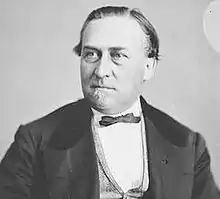 |
Quebec | Yes | Yes | Yes |
| Andrew Archibald Macdonald |  |
Prince Edward Island | Yes | Yes | No |
| Sir John A. Macdonald | 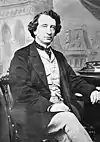 |
Ontario | Yes | Yes | Yes |
| Jonathan McCully |  |
Nova Scotia | Yes | Yes | Yes |
| William McDougall | 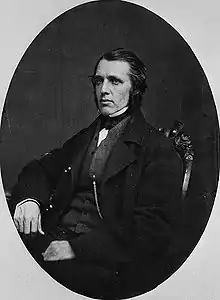 |
Ontario | Yes | Yes | Yes |
| Thomas D'Arcy McGee |  |
Quebec | Yes | Yes | No |
| Peter Mitchell | 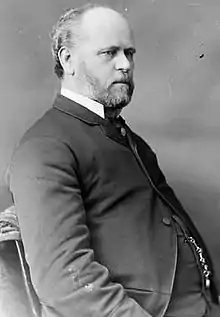 |
New Brunswick | No | Yes | Yes |
| Sir Oliver Mowat |  |
Ontario | No | Yes | No |
| Edward Palmer |  |
Prince Edward Island | Yes | Yes | No |
| William Henry Pope |  |
Prince Edward Island | Yes | Yes | No |
| John William Ritchie |  |
Nova Scotia | No | No | Yes |
| Sir Ambrose Shea |  |
Newfoundland | No | Yes | No |
| William H. Steeves |  |
New Brunswick | Yes | Yes | No |
| Sir Étienne-Paschal Taché |  |
Quebec | No | Yes | No |
| Sir Samuel Leonard Tilley | 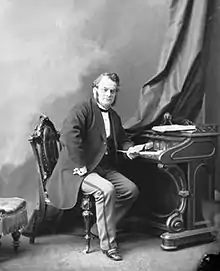 |
New Brunswick | Yes | Yes | Yes |
| Sir Charles Tupper | 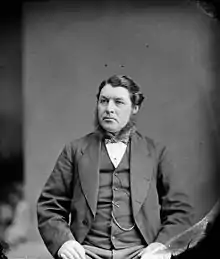 |
Nova Scotia | Yes | Yes | Yes |
| Edward Whelan |  |
Prince Edward Island | No | Yes | No |
| Robert Duncan Wilmot |  |
New Brunswick | No | No | Yes |
Group photographs and paintings
 Delegates from the Legislatures of Canada, gathering on the steps of Prince Edward Island's Government House for the Charlottetown Conference – Photo by George P. Roberts on September 11, 1864.
Delegates from the Legislatures of Canada, gathering on the steps of Prince Edward Island's Government House for the Charlottetown Conference – Photo by George P. Roberts on September 11, 1864. Delegates of the Legislatures of Canada gathering at the Quebec Conference – Photo by Jules I. Livernois on October 27, 1864.
Delegates of the Legislatures of Canada gathering at the Quebec Conference – Photo by Jules I. Livernois on October 27, 1864. An 1885 photo of Robert Harris' painting, completed the previous year and titled, Conference at Quebec in 1864, to settle the basics of a union of the British North American Provinces, also known as The Fathers of Confederation. The original painting was destroyed in the 1916 Parliament buildings Centre Block fire. The scene is an amalgamation of the Charlottetown and Quebec City conference sites and attendees.
An 1885 photo of Robert Harris' painting, completed the previous year and titled, Conference at Quebec in 1864, to settle the basics of a union of the British North American Provinces, also known as The Fathers of Confederation. The original painting was destroyed in the 1916 Parliament buildings Centre Block fire. The scene is an amalgamation of the Charlottetown and Quebec City conference sites and attendees.
Other possible claimants to title
Four other individuals have been labelled as Fathers of Confederation. Hewitt Bernard, who was the recording secretary at the Charlottetown Conference, is considered by some to be a Father of Confederation.[3] The leaders most responsible for bringing three specific provinces into Confederation after 1867 are also referred to as Fathers of Confederation.[1]
- The provisional government established by Louis Riel ultimately negotiated the terms under which Manitoba entered the Canadian Confederation in 1870.[4]
- The leadership of Amor De Cosmos was instrumental both in bringing democracy to British Columbia and in bringing the province into Confederation in 1871.[5]
- The province of Newfoundland entered the Canadian Confederation in 1949 under the leadership of Joey Smallwood, who was then referred to as the "only living Father of Confederation".[6]
See also
References
- 1 2 "Fathers of Confederation". CanadianHistory. 2008. Archived from the original on 2010-08-21. Retrieved 2010-06-21.
- 1 2 Bélanger, Claude (2001). "Studies on the Canadian Constitution and Canadian Federalism". Department of History, Marianopolis College. Archived from the original on 2010-06-11. Retrieved 2010-06-21.
- ↑ Harrison, Robert A (2003). The conventional man. Canadian Legal History by University of Toronto Press. p. 627. ISBN 0-8020-8842-2. Archived from the original on 2018-03-28. Retrieved 2011-09-02.
- ↑ The Heritage Centre. "Louis Riel The Provisional Government". Archived from the original on 10 August 2007. Retrieved 23 September 2007.
- ↑ Frances, Stanford (2002). Canada's Confederation. S&S Learning Materials. p. 44. ISBN 1-55035-708-5. Archived from the original on 2018-03-28. Retrieved 2011-09-02.
- ↑ Argyle, Ray (2012). Joey Smallwood, Schemer and Dreamer. Dundurn Press. ISBN 9781459703698.
Further reading
- Careless, J.M.C. "George Brown and Confederation", Manitoba Historical Society Transactions, Series 3, Number 26, 1969-70 online
- Coucill, Irma (2005). Canada's Prime Ministers, Governors General and Fathers of Confederation. Pembroke Publishers. ISBN 1-55138-185-0.
External links
- Fathers of Confederation - Library and Archives Canada
- Barron Chandler - Parks Canada